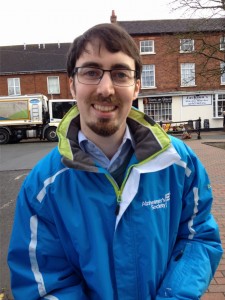
Its important to know that, as churches, we dont have to go it alone! So were building strong relationships with many organisations which are involved with dementia locally.
David Latcham is an Information Worker at the Alzheimers Society in Shropshire. He works to raise awareness of dementia within our communities and so some of our churches are working closely with him. I interviewed David about his work.
Whats your role?
As an Information Worker with the Alzheimers Society I cover the whole of Shropshire, including Telford and Wrekin. Over a third of people living with the symptoms of dementia dont have a diagnosis, which means they cant access the treatments, support and services available to those with a diagnosis, or make plans for their future. I raise awareness of dementia to help provide information and signpost people to where they can get the help they need, with an aim of countering some of the fear that is many peoples first reaction when thinking about dementia.
What does that look like in practise?
Certainly no two days look alike! I meet with GPs and communities, to listen to their needs, and together work out how we can move forward to highlight dementia and support those living with it that they come across. I run events to raise awareness, like the Dementia Friends Information Sessions or Dementia Community Roadshow. I also provide information, from leaflets to books and factsheets, and highlight the many dementia services available, locally and nationally.
Whats your personal experience of dementia?
I first came across those with dementia whilst working as a Pastoral Assistant in a group of Christian Care Homes in London. I supported the residents, relatives and staff in a home where those with advanced dementia lived. I have so many stories about how we laughed, cried, joked and lived life together. I gained a great respect for those who live daily with dementia, whether personally or as a carer. They are amazing people, and I love that my role enables me to help support them.
What should I do if Im worried about memory loss and think I may have dementia?
Id recommend speaking to someone, which helps prevent you either ignoring something significant, or worrying for no reason. One of the best people to speak to would be your GP. Tell them about what you have noticed in yourself, and how your memory worries might have changed how you go about daily life. Writing significant events down and taking them with you can be a real help to both you and the GP. In addition, the Alzheimers Society National Dementia Helpline is open seven days a week during the day and some evenings, with trained Helpline Advisers to discuss your questions and concerns about dementia. Their number is 0300 222 1122.
What are the advantages of an early diagnosis of dementia?
An early diagnosis helps people to live well with their dementia, through information, access and time. With it people can become informed about what they are experiencing and develop ways to live well around the dementia and how it affects them. A diagnosis may give them access to treatments, depending on the cause of dementia. They will certainly be able to access support, and many of these services focus on those with a diagnosis of dementia, from caf groups to carers training. It also gives people time to plan how they can maintain their independence for as long as possible, and put good decisions in place for their future. Too often I hear of people who put off their worries until they are at crisis point, at which point all those benefits above are far less useful or effective.
Wheres God in all this?
Taking my Alzheimers Society hat off and speaking from my own faith and experience, I see God most clearly when I think about what faith looks like when someone has dementia. What happens when they forget the songs, the liturgy, and the prayers that they had known? I find help and challenge as I see that faith is not about me knowing where someone is with God, but about God knowing where they are with him. It means that he is present and active with people, even if I dont see it. Its a humbling position to be in, but as true for those without dementia as those with it. Its also freeing as it highlights that faith is about Gods grace and not my own knowledge of a persons heart. I can really be used by God in the life of a person with dementia, whilst not needing to lose heart if I dont see the fruit myself.
If you would like to get in contact with David in relation to his role with the Alzheimers Society, please email him on david.latcham@alzheimers.org.uk, or you can phone him at the Wellington Office on 01952 250401 or on his mobile on 07802 860 158